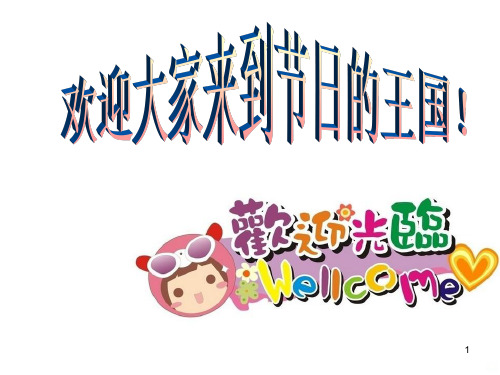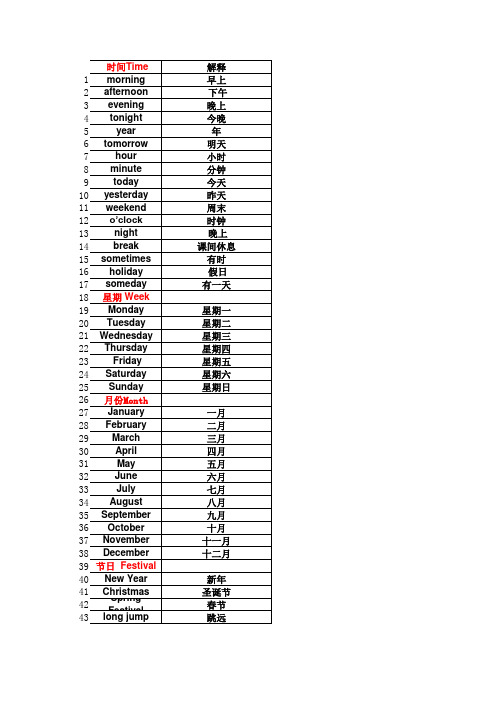小学英语节日名称
小学四年级重点知识归纳常见文化节日的英文表达

小学四年级重点知识归纳常见文化节日的英文表达Chinese New YearChinese New Year, also known as the Spring Festival, is the most important traditional festival in China. It is celebrated on the first day of the lunar calendar, which varies from late January to mid-February. During the festival, people gather with their families, exchange greetings, and enjoy festive meals. They also decorate their homes with red lanterns, couplets, and paper-cuttings to bring good luck and ward off evil spirits.National DayNational Day, also known as the Chinese Independence Day, is celebrated on October 1st each year to commemorate the founding of the People's Republic of China. It is a public holiday that marks the beginning of a week-long Golden Week holiday. During this time, various festivities and events are held across the country, including grand parades, fireworks displays, and cultural performances. It is a time for the Chinese people to express their love for their country and celebrate its achievements.Mid-Autumn FestivalThe Mid-Autumn Festival, also known as the Moon Festival, falls on the 15th day of the 8th lunar month, usually in September or October. It is a time for family reunions and worshipping the moon. People enjoy mooncakes, a traditional pastry filled with sweet or savory fillings, and light lanterns to celebrate the festival. It is also believed that on this day, themoon is at its fullest and brightest, symbolizing unity and harmony among families.Dragon Boat FestivalThe Dragon Boat Festival, also known as Duanwu Festival, is celebrated on the 5th day of the 5th lunar month, usually in June. It commemorates the great poet Qu Yuan, who drowned himself in a river to protest against corruption. The festival is known for its dragon boat races, where teams of rowers paddle vigorously to the beat of drums. Zongzi, glutinous rice wrapped in bamboo leaves and filled with various ingredients, is a traditional food eaten during this festival.Qingming FestivalThe Qingming Festival, also known as Tomb-Sweeping Day, is observed on April 4th or 5th of each year. It is a time for people to pay respects to their ancestors by visiting their graves, cleaning the tombstones, and making offerings of food and other items. People also take part in outdoor activities, such as flying kites and enjoying spring outings, to embrace the arrival of spring after the cold winter months.Lantern FestivalThe Lantern Festival marks the end of the Chinese New Year celebrations and is celebrated on the 15th day of the first lunar month, usually in February or March. During this festival, people light up and hang lanterns in various shapes and colors to create a vibrant and festive atmosphere. Lantern riddles are also a popular activity, where lanterns are adorned with riddles for people to solve. Eating tangyuan, sweet dumplingsmade of glutinous rice flour, is a traditional custom during the Lantern Festival.In conclusion, these are some of the common cultural festivals in China and their English expressions. Celebrating these festivals not only helps preserve Chinese traditions but also promotes cultural exchange and understanding on a global level.。
2022-2023学年小学英语五下Unit 7-Unit8知识点讲解+练习(译林版三起)

2022-2023学年小学英语五下Unit7-Unit8知识点讲解+练习(译林版三起)Unit7 Chinese festivals【四会单词】1.festival 节日2.Spring Festival 春节3. January 一月4. February 二月5. call 叫作,称作6. Chinese New Year 中国农历新年7. get together 团聚 8. dumpling 饺子9. Dragon Boat Festival 端午节10. May 五月11. June 六月 12. dragon boat race龙舟比赛;赛龙舟13. place 地方,地点 14. rice dumplings粽子15. Mid-Autumn Festival中秋节 16. September 九月17. October 十月 18. moon cake 月饼19. Double Ninth Festival 重阳节 20. November十一月21. old 老的,年纪大的 22. mountain 山,山脉23. rice cake 重阳糕24. Mother’s Day母亲节快乐25. Father’s Day父亲节 26. favourite 最喜欢的【词组短语】1.Spring Festival 春节2.in January or February 在一月或二月3.Chinese New Year中国农历新年4.get together团聚5.eat dumplings 吃饺子6.Dragon Boat Festival 端午节7.dragon boat races龙舟比赛;赛龙舟8.eat rice dumplings吃粽子9.at this festival 在这个节日10.Mid-Autumn Festival中秋节11.in September在九月份12.at night在夜晚13.eat moon cakes吃月饼14.Double Ninth Festival 重阳节15.old people老人16.climb mountains爬山17.eat rice cakes吃重阳糕18.on the second Sunday在第二个星期日19.on the second Sunday of May 在五月的第二个星期天20.on Mother’s Day在母亲节21.all festivals 所有的节日22.give…presents给…礼物23.talk about 谈论24.some flowers一些花25.Happy Mother’s Day母亲节快乐26.Father’s Day父亲节27.a day for mothers 妈妈的节日28.dress up乔装打扮29.in the tree 在树上(外来物)30.on the thirty-first of October 在10月31日31.knock on the door 敲门32.trick or treat 不给糖就捣乱33.eat a lot 吃很多34.have a big dinner 吃一顿丰盛的晚餐35.look at the moon 赏月36.get together with families 和家人团聚在一起37.in some places 在一些地方38.look at the moon 看着月亮,赏月39.visit their parents 拜见父母40.a festival for old people 老年人的节日【句型】1. The Spring Festival is in January or February. People also call it Chinese New Year.春节在一月或二月,人们也称它为中国新年。
小学英语文化常识及解答

1、在下列餐具中,哪一项在吃西餐中不需要用到的是A.chopsticks(筷子)B.spoon(勺子)C.knife(刀)D.fork(叉子)2、Halloween(万圣节)是哪一天?A.10月1日B.12月25日C.10月31日D.1月20日在每年的11月1日是西方的万圣节。
10月31日是万圣节前夕。
通常叫做万圣节前夜(万圣夜)。
每当万圣夜到来,孩子们都会迫不及待地穿上五颜六色的化妆服,戴上千奇百怪的面具,提着一盏“杰克灯”走家窜户,向大人们索要节日的礼物。
万圣节最广为人知的象征也正是这两样——奇异的“杰克灯”和“不给糖就捣乱trick or treat”的恶作剧。
华语地区常将万圣夜(Halloween)误称为万圣节。
3、Thanksgiving Day(感恩节)是哪一天?A.11月的第一个星期四B.11月的第二个星期四C.11月的第三个星期四D.11月的第四个星期四感恩节(Thanksgiving Day),美国和加拿大节日,在每年11月的第四个星期四,由美国首创的,原意是为了感谢印第安人,后来人们常在这一天感谢他人。
在这一天起将休假两天,都要和自己的家人团聚,感恩节是美国国定假日中最地道、最美国式的节日.Mother’s Day is the second Sunday in May.母亲节在五月份第二个星期天Father’s Day is the third Sunday in June.父亲节在六月份第三个星期天4.中号衣服的标志是?A. SB.LC. MD. YL大— Large M中— Medium S小— Small5、我们每天____上学,____放学。
我们热爱我们伟大的祖国_____ 。
A . am, pm, USAB . am, pm, PRCC . pm, am, UKD . pm, am, PRC (PRC中华人民共和国)6.He is a fat cat(引申义). 他是一个大亨7.英语字母中的大写形式有三笔完成,小写形式由两笔完成的是__和__A. E, N B . F, I C . H, F D. F, X8. 选出既能表示水果,又是颜色的单词A. RedB. orangeC. peachD. banana9.An English woman will not glad when you ask her about ___?英国女人不喜欢别人问她的年龄 A.her name B.her age C. her home D. her child10. UFO的意思是?A. 贵宾B.不明飞行物C. 人民币D. 英国广播公司11. VIP的意思是?A. 贵宾B. 不明飞行物C. 人名币D. 英国广播公司12. China有中国的意思;而china有___的意思A. 中国人B. 汉族C.瓷器D. 名族13.what letter is a drink?哪个字母的读音可以理解为一种饮料?A. BB. VC.T(音同tea 茶)D. G14. 生活中,我们经常能用到一些英文字母,如在医院中有检查,书店中有《阿正传》,在家中我们看节目。
小学英语节日PPT课件

• Who are you?
treat?
treat?
•
• • •
• • •
I’m a ghost. I’m a little ghost. Knock knock.Trick or treat? Who are you? I’m a ghost. I’m a little ghost Knock knock.Trick or treat? Who are you? I’m a cowboy. I’m a little cowboy.
39
40
• This is the way the witches fly, • Witches fly , witches fly, • This is the way the witches fly,
This is the way the pumpkins laugh, Pumpkins laugh, pumpkins laugh,
1
中秋节 Mid-autumn Festival
复活节 Easter
端午节 Dragon Boat Festival
圣诞节 Christmas Day
春节
The spring Festival
万圣节 Halloween
2
• Labour Day(May Day)劳动节 • Teachers’ Day 教师节 • Mothers' Day 母亲节 • Children‘s Day儿童节 • New Year’s Day 新年 • Thanksgiving Day感恩节 每年十一月第四个星
日之一,被称为“死人之日”,
或者“鬼节”。这一天各种恶
鬼出没,死去人们的灵魂也会
离开身体,在世间游走,这一
小学节日主题中英语手抄报内容范文

小学节日主题中英语手抄报内容范文一、春节(Spring Festival)春节是中国最重要的传统节日,通常在农历正月初一庆祝。
以下是一些关于春节的英语手抄报内容:1、节日介绍The Spring Festival, also known as Chinese New Year, is the most significant festival in China It marks the beginning of a new lunar year and is a time for family reunions, feasts, and various traditional activities2、传统习俗People clean their houses thoroughly before the festival to sweep away bad luck They decorate their homes with red couplets, red lanterns, and colorful New Year pictures On New Year's Eve, families have a big dinner together, featuring dishes such as dumplings, fish, and chicken After dinner, they stay up late to welcome the new year and set off firecrackers to drive away evil spirits3、新年祝福Happy New Year! May all your dreams come true in the year of the Rabbit Good luck and prosperity in the new year! Wishing you a happy and healthy life4、春节传说There is a legend about a monster called "Nian" who would come out to harm people on New Year's Eve But people found that Nian was afraid of the color red and loud noises So they started to use red decorations and set off firecrackers to scare Nian away二、元宵节(Lantern Festival)The Lantern Festival falls on the 15th day of the first lunar month It is a celebration of the end of the Spring Festival1、节日特色People enjoy viewing various kinds of lanterns in the streets and parks The lanterns come in different shapes and colors, such as animals, flowers, and figures from Chinese myths and legends2、传统美食Sweet dumplings are a popular food during the Lantern Festival They are made of glutinous rice flour and filled with sweet fillings like sesame, peanut, or red bean paste3、活动There are also lion and dragon dances, riddle guessing games, and fireworks displays Riddle guessing is very interesting People write riddles on lanterns and others try to solve them4、意义The Lantern Festival symbolizes family unity and happiness It is a time for people to have fun and enjoy the last moments of the Spring Festival三、清明节(TombSweeping Day)TombSweeping Day, also known as Qingming Festival, usually falls around April 4th or 5th in the solar calendar1、节日目的It is a day for people to remember and honor their ancestors by visiting their graves, cleaning the tombs, and offering sacrifices2、传统活动People also fly kites, plant trees, and enjoy the spring scenery Some families have a picnic near the graves to spend time together3、诗句"清明时节雨纷纷,路上行人欲断魂。
小学英语新外研版(一起)五年级上册西方节日

•
•
•
在古时候,如果有旱灾或是 其它重大的灾难,人们便会带上 丑陋的面具,因为他们害怕深夜 还在外面游走的恶灵,如果晚上 必须出门,便会戴上面具或用动 物的皮毛装饰自己,希望恶灵认 不出他们来,或被丑陋的面具吓 走。在万圣节还有雕刻南瓜灯的 习俗,这是一则趣味的爱尔兰的 民间传说。据说有一个名叫杰克 的酒鬼,他有一天邀请恶灵来一 起喝酒,但喝完后却没钱付账, 他就设计要恶灵变成六便士 来付 酒钱,可是杰克又没拿它来付钱, 反而用一条银纸镇住恶灵让它出 不来。 恶灵苦苦哀求杰克放他出来 并答应不来吓他、骚扰他,于是 杰克就它出来,到了第二年万圣 节,恶灵又与杰克达成协议,答 应这一年不会来骚扰杰克,但没 过多久杰克就过世了,这时天堂 拒绝收容他,杰克只好到地狱报 到,可是因为恶灵已经答应他这 一年不骚扰他,所以也无法收容 杰克。 天堂地狱都去不得,杰克怎么办 呢?而且路实在是太黑了,杰克 也找不出路离开,这时恶灵就丢 给他一块已经烧得通红的煤炭让 他在黑暗的地狱中比较能看清楚 路,杰克将这小块媒炭灰烬放在 一个打了许多洞的菜头当中,好 让它烧久一点。这就是“南瓜灯” 的由来。
•
例如,"不给糖就捣蛋"这个习俗, 来源于异教徒相信鬼魂会在每年降 临人间的时候给活着的人制造麻烦。 为了保护自己不被恶灵伤害,人们 穿上看起来像鬼的衣服,并且准备 面包、鸡蛋、苹果等食物当供品以 求好运。人们戴着面具,穿着迷惑 鬼魂的鬼服,挨家挨户收供品。慷 慨的人点起灯火,受到良好祝愿, 但吝啬的人却受到威胁。 • 这个习俗延续至今,成千上万的儿 童穿戴起来,逐户敲门要求款待。 然而大多数现代人并不怕鬼,在万 圣节,当小气的人看见有人拿着" 家伙"经过,并朝小气的人的家里 丢鸡蛋的时候,不免会有些提心吊 胆。
1-6年级最新人教版小学英语单词表 时间Time 星期 Week 月份Month 节日 Festival

解释 早上 下午 晚上 今晚 年 明天 小时 分钟 今天 昨天 周末 时钟 晚上 课间休息 有时 假日 有一天 星期一 星期二 星期三 星期四 星期五 星期六 星期日 一月 二月 三月 四月 五月 六月 七月 八月 九月 十月 十一月 十二月 新年 圣诞节 春节 跳远
44 45 46 47 48 49 50 51 52
morning exercises race baseball Children’s Day Thanksgiving Dragon Boat Festival Flag Day Lantern festival Mid-Autumn festival
早操 比赛 棒球 儿童节 感恩节 端午节 国旗日 元宵节 中秋节
1 2 3 4 5 6 7 8 9 10 11 12 13 14 15 16 17 18 19 20 21 22 23 24 25 2ห้องสมุดไป่ตู้ 27 28 29 30 31 32 33 34 35 36 37 38 39 40 41 42 43
时间Time morning afternoon evening tonight year tomorrow hour minute today yesterday weekend o’clock night break sometimes holiday someday 星期 Week Monday Tuesday Wednesday Thursday Friday Saturday Sunday 月份Month January February March April May June July August September October November December 节日 Festival New Year Christmas Spring Festival long jump
小学英语节日汇总

onTree-planting Day植树节)
on the twelfth of March
plant trees
at Easter
(在复活节)
in March or April
(在3月或4月)
make Easter eggs
eat chocolate eggs
(在6月1日)
sing and dance
have parties
atDragon Boat Festival
(在端午节)
in May or June
(在5月或6月)
watch dragon boat races
eat rice dumplings
on Teachers’Day教师节
on the tenth ofSeptemper
(在1月或2月)
watch a lion dance
watch fireworks
have a big dinner
at Lantern Festival(元宵节)
in February or March
make and eat tangyuan
on Women’sDay妇女节
On the eighth of March
eat the Double Ninth cake
give presents to grandparents
onNational Day
(在国庆节)
on the first of October
(在10月1日)
go to parks and beaches
meet relatives and friends
